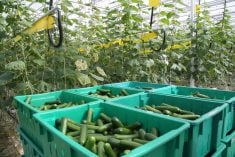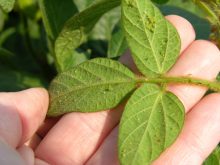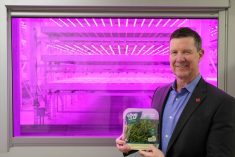Climate change isn’t just resulting in more unpredictable weather, it’s also making it easier for pests and diseases to move into new areas where they’ve previously been unable to thrive.
That’s why fruit and vegetable growers in many of the world’s leading horticultural production areas are turning to innovation – specifically with insects – to combat this new threat.
WHY IT MATTERS: Growers are increasingly under pressure to minimize or even eliminate the use of pesticides in horticulture, so they’re in need of new tools that will protect their crops from both yield loss and cosmetic damage that could make produce unsellable in the marketplace.
Read Also

Claas brings 1000 Series SP forage harvesters to Canada
In mid-August, Claas unveiled its new line of Jaguar forage harvesters at an event in Visalia, California, deep in the heart of that state’s dairy region.
In South Africa, Insectec is one such company focused on insect innovation. Growers in that country need help controlling mealy bugs. This pest attacks citrus and grapes in particular by sucking plant sap and leaving a sticky substance called honeydew behind that promotes mould growth.
Founded in 2015 in the garage of an accountant with a passion for insects, the company today has 70 employees and markets four main products of natural mealy bug controls in South Africa, as well as Spain and some other European countries.
Three large South African fruit growers, Komati, Mahela and Laeveld Citrus, are shareholders.
“We focus on biologicals and using beneficials to rebalance or restore natural balance and control pests with natural predators,” Nadine Botha, senior technical field agent, said during a recent tour of the facility. “We produce predators and parasitoids that go after mealy bugs – parasitic wasps and predatory beetles. We can’t export fruit to countries like South Korea if there are signs of mealy bugs (on the fruit).”
Mandarin oranges and grapefruit have the biggest mealy bug problems, she noted, so growers often do preventative releases of the biologicals to get ahead of an issue. An estimated 60 to 70 per cent of South African farmers used Integrated Pest Management and don’t spray for mealy bugs.
Ongoing research and new product development, as well as field support for growers and good quality biologicals are critical to the company’s success, added Joné Reynolds, head of production.
“Biologicals aren’t a product a grower can just use; so we provide support with population monitoring, adjusting chemical practices and introducing the right biologicals,” Reynolds said.
“It’s important to introduce the right species at the right rate and the right time using the right method.”
An ongoing challenge for Insectec – and by extension growers – is the lack of regulations for biologicals in South Africa. The absence of standards and rules means it can take up to three years for a biological to be approved for sale, so the industry has formed the South African Bioproduct Organisation to self-regulate this emerging field using ethical and science-based standards.
In Spain, Agrobio has established its facility in Almeria province, the heart of that country’s vast greenhouse production area often referred to as the “sea of plastic”. The region is a major supplier of fruits and vegetables, especially tomatoes, peppers and cucumbers, to Europe.
Agrobio produces bumble bees for pollination, currently covering over 50,000 hectares worldwide, and beneficial bugs for pest control that are used in more than 27,000 hectares of production globally. More than 40 species are used on crops like strawberries, melons, peppers, tomatoes and cucumbers.
“Our main line of work is developing new species, genetic adaption, and effective protocols and doing research on what nutrients bugs need in the field when working,” said Isabel Santorromán Mendizábal, business co-ordinator at Agribio.
“But we also need to focus on what is happening underground and rediscovering soil life. The European Union is telling us we need to regenerate the soil, so we are also working in projects to give solutions to create the life in the soil.”
Canada is an emerging market, she added, but because insects must arrive at grower facilities healthy and ready to work, what the company really needs is local production to be successful and they’re looking at potential in the Leamington area.












